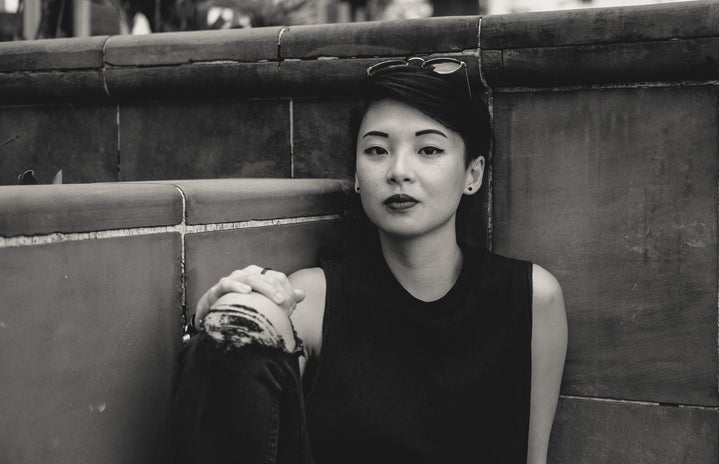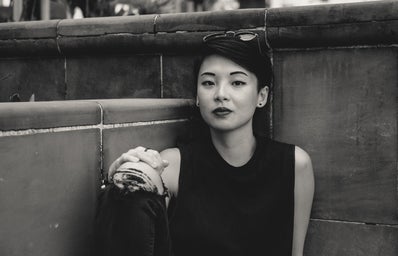“You speak very good English.”
I paused, caught between continuing to bag the man’s cereal or responding to his ironically poor display of the English language. The older woman standing behind him gasped. She looked at me expectantly, waiting for me to tell him off, to say something like “Thank you. You don’t.”
Reply in Spanish, the devil on my shoulder whispered. Or better yet, German. Oh, what about American Sign Language?
While the thought of messing with the man made me smile a bit, I didn’t feel like causing a scene. Stalling for time, I pulled his grocery bag off the rack and held it out. But he didn’t move, waiting for an answer I wasn’t prepared to give.
Had it been my first time hearing that phrase at work, or even that day, I wouldn’t have given the man a second thought. Growing up in a rural town in Pennsylvania, where the number of Asians I had seen did not exceed the amount of fingers on my left hand, I almost expected ignorant questions. My parents stuck by the idea that what makes you different makes you special. But, to some, the distinctions between special, weird, and unknowable aren’t all clear. I was used to being asked where I was from—really from—or if I was American. Their questions weren’t harmful, I convinced myself, merely ignorance stemming from inexperience.
But it had not been the first time that day. It had been the fourth. And I was growing weary of being treated with the assumption that I was somehow less than simply because I was presumably raised somewhere else.
I was adopted from China when I was 10 months old, too young to remember anything substantial no matter how many times I’m asked what my experience was like. The U.S. is all I’ve ever known. I grew up watching Hannah Montana and The Lion King. I begged my parents to get me a Happy Meal from McDonald’s every time we left the house. I said the Pledge of Allegiance every morning at school, hand pressed against my chest as if applying enough pressure would imprint Americanism on my heart.
But it didn’t matter how many American things I did. To others, I was just Chinese. That was my identity. No more, no less.
I was home-schooled until third grade, where I entered elementary school with the naive expectation that making friends would be easy and that acceptance would be given freely. Ah, the innocence of youth. I was not prepared for the kids who pulled at the corners of their eyes and muttered unintelligible gibberish at me on the bus. I flinched when classroom discussions mentioned China and every eye would swivel to stare directly at me. I bristled whenever someone insisted that I should date the Japanese boy in my grade because “You’re both Asian. It’s meant to be.”
The summer before fifth grade, I begged my parents to let me return to cyber-school, only going to public school for electives and the occasional field trip. It would be three years before I returned to attending public school full time.
Junior high was when your identity and reputation suddenly became your top priority. You had to make a name for yourself, but only in the acceptable ways. You had to fit in but also stand out in order to be popular. Your identity was all you had, and we were expected to shout it from the rooftops.
It was hard for me to establish my identity when I was constantly being mistaken for someone else. There were four Asian girls in my junior high, including me, all in different grades. Some were tall, some were short, and some were skinny as rails. Some had bangs, some had piercings, and some never spoke a word. By the time I moved to the high school, I had been mistaken for all of them.
Since I started junior high attending both cyber and public school, I had to check in at the attendance office every day. Every day, the secretary would smile at me, ask for my name, and promptly sign me in. Every day, I would comply, intrigued as to how many students she must see every day to not recognize me after three years of the same routine.
One day, she beamed at me and said, “Wait, don’t tell me your name. I know you.”
My heart soared. She’d finally remembered. She did care after all.
“You’re Lily, right?”
“No,” I replied, trying to hide my disappointment. Lily’s the Asian girl in the grade below me.
After that incident, my exasperation at being shoved into a racial stereotype turned into amusement. After all, what was the point of getting frustrated? People didn’t understand why, and nothing changed. Getting mad was a waste of energy. Seeing how wrong people were about my personality soon became a game. How far off could they possibly be? When they realized their mistake, would they blink blankly back at me or would the embarrassment turn them fire engine red? It turns out, people will never cease to amaze you.
“Are you A, C, or J?” my friend asked me in science class.
“Excuse me?”
“Are you A, C, or J?”
“What does that even mean?”
“Asian, Chinese, or Japanese?”
Amused but slightly miffed, I replied, “Well, Chinese and Japanese people are both Asian. And there are other countries in Asia, like Korea or Mongolia.”
“Isn’t that a tree?”
I burst out laughing, along with our entire table. “That’s magnolia, hon.”
No, people will never cease to amaze you. Especially when, after people have insisted that you’re one thing for so long, they suddenly adamantly insist that you’re something else.
I was working a closing shift at the grocery store, leaning against the express counter anxiously awaiting when I could finally go home. An old man shuffles in with ten minutes to spare, grabs a few items, and places them on the counter. After a few minutes silently staring at me as I check out his groceries, he leans over the counter and lowers his voice, like he’s about to tell me the most precious secret in the world.
“You know, even under that mask, I can tell you’re one of them Mexican girls.”
It took all my energy not to laugh in his face. After he left, I told my manager why I was chuckling so hard, and we both had a good laugh as we shut down the store.
Sometimes I’d rather be associated with something I’m not rather than something I am. Whenever talk of communism or the Covid-19 pandemic emerges, disdain for China and its people follows shortly thereafter. People claim that the entire country’s evil, that it would be best if the entire thing just disappeared one day. And though I have never lived there, I feel guilty. Because, even if I’ve never resided there, China is still my home country. And I’m still a representative of said country despite my never having fully understood what that truly means.
So there I stand, a grocery bag full of cereal in one hand, trapped between acknowledging a misunderstanding of my identity or accepting a compliment that tastes a bit sour. I stare at this thirty-something man, both too young and too old for me to make excuses for his back-handed compliment. For the briefest of moments, I debate smacking him.
“Thank you,” I say finally. “Have a nice day.”


